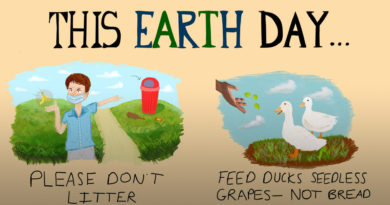Climate Change Endangers More Than Just The Polar Bears
For some people, the words “climate change” might conjure up the image of an emaciated polar bear standing on a thinning ice cap or the sad eyes of a panda bear without enough bamboo. While the destruction of habitats and ensuing decrease in biodiversity is an important and unfortunate effect of climate change, it is important to shift thinking to associating climate change with consequences on us, the humans, in order to effect change.
Rising global temperatures due to the trapping of heat by CO2 in our atmosphere can lead to shorter winters and longer vector lifespans. Vectors are organisms like ticks or mosquitoes that can spread disease from one host to another. Ticks are blood sucking parasites responsible for spreading Lyme disease in the northern states. These insects are spreading up North and living longer because of the warming climate, potentially exposing more people to Lyme disease, which can ultimately cause joint, cardiac, and neurological problems in the host. Equally problematic, the mosquito is notorious for transmitting malaria, Zika virus, and West Nile virus, among other diseases.
While there are many species of mosquito, the Aedes mosquito in particular is responsible for transmitting the Zika virus. The 2016 outbreak of Zika in Brazil spread as far north as Wynwood which raised concern for pregnant women in South Florida after seeing the devastating effects on Brazilian babies born to mothers who were carrying the virus. These microcephalic babies suffer from improper brain development, joint problems, and vision impairment.
The spread of communicable diseases is not the only cause for concern as global temperatures rise; both cardiovascular and respiratory health can be compromised even in relatively healthy individuals. A recent study by Alexandra Schneider and her team from the German Research Center for Environmental Health suggested that heat-related heart attacks were on the rise in Augsburg and that both cold and hot temperatures can be linked to an increased incidence of heart attacks.
On another note, higher temperatures also cause extremes in the water cycle. As more water evaporates, warm air holds more water vapor which leads to heavier rainfall and increased flooding. Flooding can cause certain microbes to grow since a wet and warm environment is hospitable to mold and fungi which can aggravate symptoms in asthmatics or people who have allergies. Warmer temperatures also cause a longer pollen season and increased humidity, affecting those with asthma as well. Hotter and longer summers also lead to more wildfires and the smoke from these fires can lead to an acute exacerbation of chronic obstructive pulmonary disease.
Climate change also has detrimental effects on mental health that cannot be ignored. The Centers for Disease Control and Prevention states that the suicide rate increases as temperatures rise. They also state that older adults with dementia are at risk for hospitalization and even death during heat waves. Post-traumatic stress disorder is associated with the devastating effects of wildfires and hurricanes including displacement, injury, and death. Recently, Hurricane Dorian left many Bahamians homeless or dead. Extreme weather events like this one can leave the people of an entire nation with a sense of loss and the effects can be seen long after a hurricane has passed or a wildfire extinguished.
According to NASA’s Goddard Institute for Space Studies, the average global temperature has increased just over one degree Fahrenheit. As a global community, we are trying to prevent this from rising more by taking action and implementing initiatives that limit our carbon footprint as individuals and nations. Even though President Trump has recently announced the United States’ withdrawal from the Paris Climate Accord, as individuals we can still do our part in increasing our environmental literacy and taking small steps toward becoming environmentally conscious global citizens not just for the pandas and polar bears, but for ourselves and our future families.




